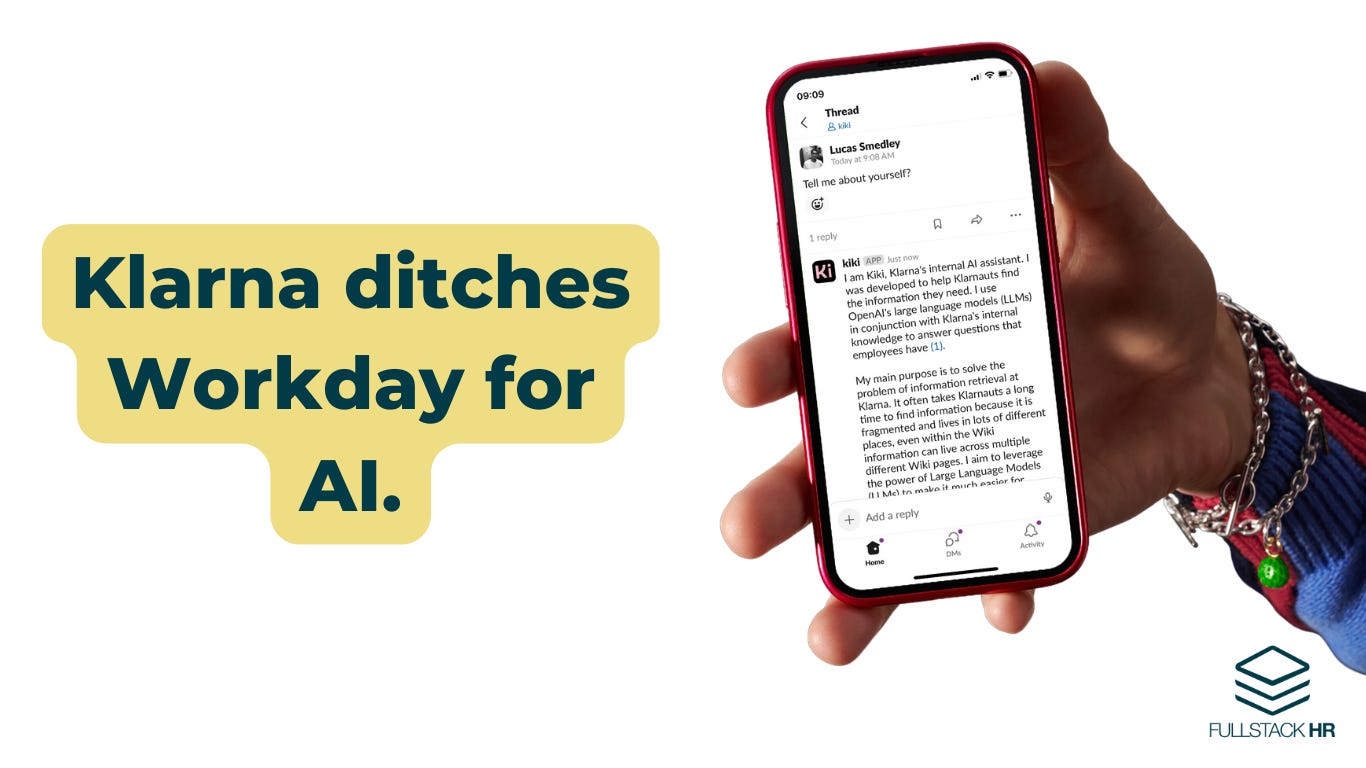Klarna ditches Workday for AI.
PR stunt or future of HR?
Welcome to FullStack HR, and an extra welcome to the 62 people who have signed up since last week. If you haven’t yet subscribed, join the 7400+ smart, curious HR folks by subscribing here:
Happy Tuesday,
Last week, together with Teamtailor, I hosted a webinar for recruiters; if you speak Swedish, check it out here.
I’m showing you how to work with ChatGPT and the excellent AI agents within Teamtailor. As a bonus, I am also building a dashboard for your recruitment KPIs with Claude.
I’m bound for Malmö today and next week. I was supposed to head over to Vegas for HR Tech, but due to my grandpa's passing, I’ll have to stay on this side of the Atlantic this year.
Lucky for me (and you!), HR Tech is returning to Europe in Amsterdam on 4-5 March next year.
That aside, this week’s newsletter was meant to be about how to use Generetiv AI at work and why adoption rates are so low.
But then people started talking about Klarna…
My urge was not to write about Klarna.
The whole debate largely stems from this interview (highly recommended, by the way), which is almost two months old.
I’ve commented on their H1 report on LinkedIn (also worth a read, especially their AI strategies).
It’s old news.
But in the last week, the topic has resurfaced not once, not twice, but more than so. And universally, people call what Klarna is doing a “PR stunt” or “unrealistic”.
And then, obviously, my fingers start to itch….so here we are.
It’s also why the newsletter is sent out so late.
Sweden is home to global innovators like Volvo, Spotify, and Klarna—companies that often challenge the status quo.
The latter has been generating headlines throughout this year around its AI initiatives. First, it was about launching a chatbot that, according to Klarna, performed the equivalent of 700 full-time agents—I’ve written about this in the past.
Now, they are making headlines and sparking conversation again, both in public LinkedIn posts and closed HR forums. Klarna’s move from Workday to Deel has sparked disbelief—many dismiss it as "fake news" or a "PR stunt."
People ask, “How could a company as large as Klarna abandon a traditional HR system? Can you even do that?”
For years, we’ve been conditioned to believe that the bigger the company, the more robust and complex its HR systems need to be. The large players in the space are often seen as immovable pillars of a well-run organization.
To question their necessity feels almost rebellious.
But here’s the thing:
What if it’s not a stunt?
What if Klarna’s decision isn’t about making headlines, but about challenging the very assumptions we’ve clung to for so long?
The idea that "large corporation = large HR system" has gone largely unquestioned. And maybe that’s exactly what needs to change.
Klarna is replacing Workday with Deel and their internal chatbot, Kiki.
This isn’t speculation—the CEO has openly confirmed it, yet many find it hard to grasp. But if you’ve been following Klarna, it’s no surprise they are taking these steps.
In May, they reported that 9 out of 10 Klarna employees now harness the power of Generative AI in their daily work and that Kiki, Klarna’s bespoke internal AI assistant, has adeptly responded to over 250,000 inquiries (2,000 per day) since launching in June 2023.
Data is leverage.
And I would assume that the push for deprecating Workday and moving all queries to Kiki (which I presume sits on top of Deel) is based on a combination of Klarna’s ambitions with its AI strategy and what employees at Klarna have asked Kiki for.
This is likely a data-driven decision. Employees are asking Kiki, not using Workday, making the switch both practical and strategic. Few people, except perhaps us in HR, wake up excited about using our HR system each morning. It’s not what gets people ticking at work.
You want to be able to report your sick days.
You want to see your vacation balance.
From time to time, you want to check your salary.
If, instead of going to a wonky HR system, you could check that from where you already operate—wouldn’t that be a great thing?
All the major HRIS players are betting on the same; it’s just taking them some time to get there.
Klarna merely shortcuts them.
As for master data and pay info, they sit with Deel. HR can still access it, and it will still be compliant. I would assume that the experience on the backend for HR is also better, given that they’ll have the ability to talk to their data.
Sure, the legacy players have been around for a long time. Sure, they have engineering resources. And knowledge. The latter two used to mean a lot.
They used to be a great moat. But that moat, due to AI, is shrinking by the day.
In a few years, we’ll look back and say, “Klarna was first, but they weren’t the last.”
What we see now is a change in progress.
An alternative way of doing what used to be a known truth. It is insanely exciting, and there’s learning to be made from all of this—but that requires an open mind to what’s happening. And if we dismiss this as a “PR stunt” or “fake news,” those learnings might be lost along the way.


